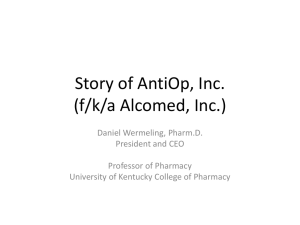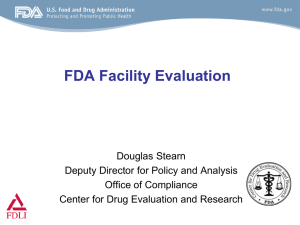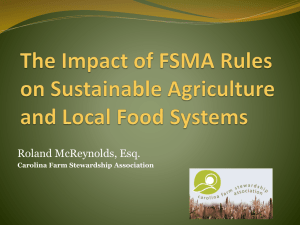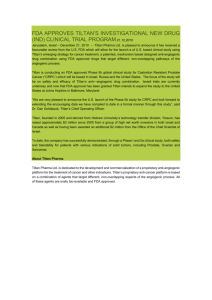FSMA-Talking-Points - Carolina Farm Stewardship Association
advertisement
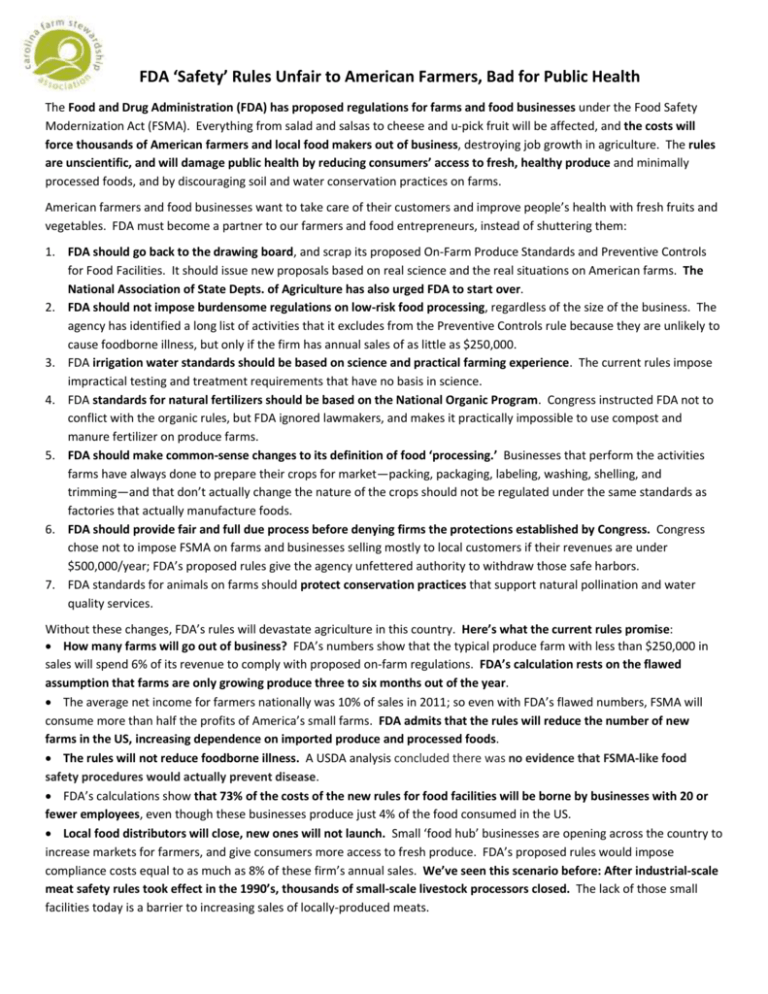
FDA ‘Safety’ Rules Unfair to American Farmers, Bad for Public Health The Food and Drug Administration (FDA) has proposed regulations for farms and food businesses under the Food Safety Modernization Act (FSMA). Everything from salad and salsas to cheese and u-pick fruit will be affected, and the costs will force thousands of American farmers and local food makers out of business, destroying job growth in agriculture. The rules are unscientific, and will damage public health by reducing consumers’ access to fresh, healthy produce and minimally processed foods, and by discouraging soil and water conservation practices on farms. American farmers and food businesses want to take care of their customers and improve people’s health with fresh fruits and vegetables. FDA must become a partner to our farmers and food entrepreneurs, instead of shuttering them: 1. FDA should go back to the drawing board, and scrap its proposed On-Farm Produce Standards and Preventive Controls for Food Facilities. It should issue new proposals based on real science and the real situations on American farms. The National Association of State Depts. of Agriculture has also urged FDA to start over. 2. FDA should not impose burdensome regulations on low-risk food processing, regardless of the size of the business. The agency has identified a long list of activities that it excludes from the Preventive Controls rule because they are unlikely to cause foodborne illness, but only if the firm has annual sales of as little as $250,000. 3. FDA irrigation water standards should be based on science and practical farming experience. The current rules impose impractical testing and treatment requirements that have no basis in science. 4. FDA standards for natural fertilizers should be based on the National Organic Program. Congress instructed FDA not to conflict with the organic rules, but FDA ignored lawmakers, and makes it practically impossible to use compost and manure fertilizer on produce farms. 5. FDA should make common-sense changes to its definition of food ‘processing.’ Businesses that perform the activities farms have always done to prepare their crops for market—packing, packaging, labeling, washing, shelling, and trimming—and that don’t actually change the nature of the crops should not be regulated under the same standards as factories that actually manufacture foods. 6. FDA should provide fair and full due process before denying firms the protections established by Congress. Congress chose not to impose FSMA on farms and businesses selling mostly to local customers if their revenues are under $500,000/year; FDA’s proposed rules give the agency unfettered authority to withdraw those safe harbors. 7. FDA standards for animals on farms should protect conservation practices that support natural pollination and water quality services. Without these changes, FDA’s rules will devastate agriculture in this country. Here’s what the current rules promise: How many farms will go out of business? FDA’s numbers show that the typical produce farm with less than $250,000 in sales will spend 6% of its revenue to comply with proposed on-farm regulations. FDA’s calculation rests on the flawed assumption that farms are only growing produce three to six months out of the year. The average net income for farmers nationally was 10% of sales in 2011; so even with FDA’s flawed numbers, FSMA will consume more than half the profits of America’s small farms. FDA admits that the rules will reduce the number of new farms in the US, increasing dependence on imported produce and processed foods. The rules will not reduce foodborne illness. A USDA analysis concluded there was no evidence that FSMA-like food safety procedures would actually prevent disease. FDA’s calculations show that 73% of the costs of the new rules for food facilities will be borne by businesses with 20 or fewer employees, even though these businesses produce just 4% of the food consumed in the US. Local food distributors will close, new ones will not launch. Small ‘food hub’ businesses are opening across the country to increase markets for farmers, and give consumers more access to fresh produce. FDA’s proposed rules would impose compliance costs equal to as much as 8% of these firm’s annual sales. We’ve seen this scenario before: After industrial-scale meat safety rules took effect in the 1990’s, thousands of small-scale livestock processors closed. The lack of those small facilities today is a barrier to increasing sales of locally-produced meats. The rules set up businesses for ‘gotcha’ inspections, instead of helping farmers and small business manage the safety risks relevant to their particular businesses. Inspectors have financial incentives to find problems and make repeat inspections.


